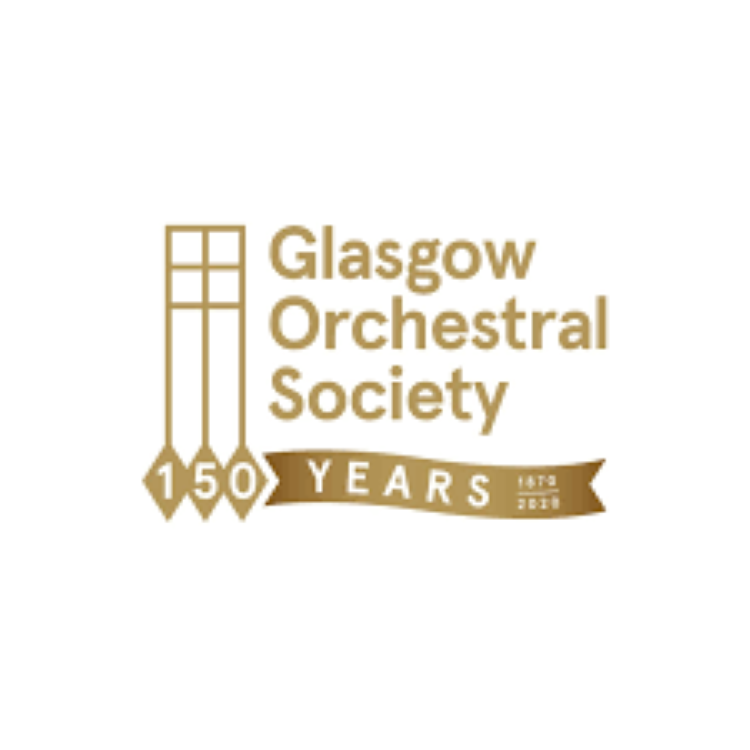150th Anniversary Concert – 7:30pm Saturday 25th March 2023, Glasgow City Halls
The Victorian age was a great age of amateur music-making, with choral societies and orchestras founded all over the British isle, and establishing a bedrock of amateur instrumental participation that continues to spark joy for audiences in Scotland to the 21st century. These amateur associations have been essential to the creation of new music as well as familiarisation with classics, and many professional players passed through their ranks in their early days, and later returned as guest soloists in the early stages of career development. This post celebrates this activity, and in particular, says “Happy 150th Birthday” to GOS – the Glasgow Orchestral Society.
Glasgow, bursting with mercantile wealth and new-found leisure opportunities for the middle-classes, saw a goodly number of groups founded in the 19th century, although not all survived and some, over time, transformed from amateur to professional. The city saw the foundation of a Philharmonic Society in 1832, and the Glasgow Musical Association in 1843, out of which grew in due course the Glasgow Choral Union in 1855 and the Choral Union Orchestra in 1874. In 1870, the Glasgow Orchestral Society emerged, also amateur. The Scottish Orchestra, semi-professional if part-time, was founded in 1891, and in 1898 merged with the Choral Union Orchestra. In the fullness of time this would morph into the organisation today called the RSNO.
Scotland’s professional orchestras are today a source of national pride, although these days worries about funding means we shouldn’t take any of this for granted. However, amateur playing matters at the level of building and maintaining grass roots support for concert going and music making, and the Glasgow Orchestral Society prides itself on being Glasgow’s oldest amateur orchestra. A survey (see below) shows it is also one of the oldest amateur orchestras in Scotland with a continuous record of playing second to none. While entry isn’t formally auditioned there are notes about playing to ‘at least Associated Board Grade 7 standard or higher’ and regular rehearsal and home practice is a must. On this basis GOS currently has about 70 players.
In 2020-21, the Glasgow Orchestral Society celebrated its 150th anniversary – or rather, didn’t quite manage to do this in public, because of COVID-19. So 2022-2023 is the year of actual celebrations. This spring’s programme includes Beethoven’s Ninth Symphony (March 25th in Glasgow City Halls), conducted by Stephen Broad and including the 100-strong City of Glasgow Chorus, founded in 1983 by Graham Taylor and currently conducted by Paul Keohone.
Amateur music groups also help to birth new compositions. GOS has also been involved in schemes to create new music, recently working with Joshua Brown as part of the ‘Adopt a Music Creator’ programme (formally called ‘Adopt a Composer’), a scheme funded by the PRS Foundation, the Philip and Dorothy Green Music Trust, and recently also by the National Lottery via Creative Scotland. The group continues to sponsor new works by Scottish composers such as John Maxwell Geddes and Tom David Wilson, giving 4 concerts annually. Membership by subscription augments ticket sales and enables the orchestra to bring in a series of guest conductors.
Amateur orchestras exist in towns and cities elsewhere around Scotland, doing great work to encourage playing for life as well as mentoring for younger players, and providing opportunities for new composition. This survey is far from complete, but just looking around the larger centres, we can list Aberdeen City Orchestra (founded in 1982); Dundee Symphony Orchestra (founded in 1893); Falkirk has the ‘Tryst’ Orchestra (founded in 2002); Stirling Orchestra (founded in 1983); Perth Symphony Orchestra (founded in 1951, first performing in 1953); the Ness Sinfonia of Inverness is a recent group founded in 2016. Edinburgh has a fair bundle of amateur groups – the Edinburgh Symphony Orchestra (founded 1963); New Edinburgh Orchestra (founded 1994, so now longer altogether new, by Edinburgh PhD student Daniel Monek); the Edinburgh City Orchestra, whose Facebook just says it is a ‘new group’ advertised its first concert in 2022. Edinburgh’s amateur provision ranges from very proficient groups such as the Meadows Chamber Orchestra (just turning 50, and according to its website, ‘one of the UK’s finest amateur orchestras’) to the self-proclaimed joyful ‘lows’ of the Really Terrible Orchestra (For the Musically Challenged), made famous by amateur bassoonist and famous writer Alexander McCall Smith, which has become a favourite feature of Edinburgh’s social life since it was first blowing and scraping in 1995. Their webpage celebrates those who couldn’t get into other amateur orchestras but who so loved playing they just made their own, playing initially for long-suffering families and friends, and encouraged to keep going by a ‘real musician’, Richard Neville Towle (Sir). But GOS is older than all of these.
It might be difficult to gather players for a symphony orchestras outside of cities, but that doesn’t stop more rural places having their own solutions. The Highland Chamber Orchestra (founded in 2000) achieves results by combining amateur with professional local players. The Caithness Orchestra formed by Thurso High School teacher Stuart Watson in the 1970s, and still going strong under the baton of Susie Dingle, accept players of a range of standards from relative newcomers to more advanced. In areas of sparser population, being prepared to play 3rd horn is a good entry qualification; I know this from having been given a horn from a Thurso High School cupboard and told to come along in a couple of weeks and take up that role. But still, I cede that GOS is older than any of these.
Smaller than full-sized symphony orchestras, a range of amateur chamber orchestras also bear witness to the vitality of the amateur instrumental scene in Scotland. In Glasgow alone, the Glasgow Chamber Orchestra (founded in 1956), the Glasgow Classical String Orchestra (founded ‘recently’), Glasgow Sinfonia (founded in 1986), and more bear witness to a range of amateur options. Still, GOS is the oldest of those I can find.
This list doesn’t include the many groups run by schools, universities, colleges and regional education programmes, dedicated to bringing on board younger players. Some are hybrid, drawing members from both the community and associated with an educational establishment, such as STAFCo, the St Andrew and Fife Community Orchestra, hosted by the University of St Andrews but also funded by the Scottish Chamber Orchestra’s community outreach project.
But this year – happy 150th birthday to the grand-dad of all these groups, to the players of the Glasgow Orchestral Society, who started amateur and are still keeping it real. Go, GOS.
Further Reading and listening
- Adopt a Music Creator
- Amateur Orchestras in Scotland
- Aberdeen City Orchestra
- Caithness Orchestra
- Dundee Symphony Orchestra
- Edinburgh Symphony Orchestra
- Falkirk Tryst Orchestra
- Glasgow Orchestral Society
- City of Glasgow Philharmonic Orchestra – facebook page
- Highland Chamber Orchestra
- Meadows Chamber Orchestra
- Ness Sinfonia
- New Edinburgh Orchestra
- Perth Symphony Orchestra
- Really Terrible Orchestra
- St Andrews and Fife Community Orchestra
- Stirling Orchestra


Wow! That’s quite an essay:)
Thanks Karen – my fondest school memories are of the Caithness Orchestra so all power to the players of GOS in their endeavours.
Tickets from https://tickets.glasgowconcerthalls.com/29349/29350